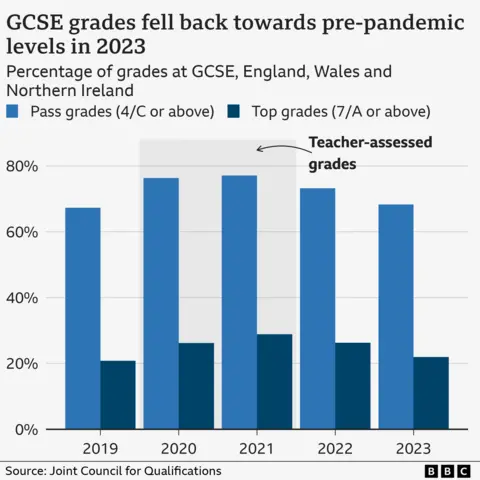World
Students wait for GCSE and BTec results

 Getty Images
Getty ImagesStudents in England, Wales and Northern Ireland are receiving GCSE, BTec Tech Awards and other level 2 qualifications on Thursday.
It is the first year that GCSE grades are expected to be similar to 2019 across all three nations.
It follows a growth in the percentage of passes in 2020 and 2021, when exams were cancelled because of Covid, and a phased effort to bring them back down.
Last year, fewer passes in English and maths GCSE exams meant more students in England needed to resit.
About 200,000 students are due to get results for BTec Tech Awards, BTec Firsts and BTec Level 2 Technical courses, while about 120,000 will receive results for Cambridge Nationals.
Most students receiving results were in Year 7 when the first Covid lockdowns were announced, so have spent every year of their secondary education in the midst, or the wake, of the pandemic.
GCSE students in England were the final year group to be given formulae and equation sheets in maths and science in recognition of the disruption, while exams were back to normal in Wales and Northern Ireland.

‘I’m aiming for straight 9s to kickstart my T-level’
 BBC/ Kate McGough
BBC/ Kate McGoughBy Kate McGough in Wright Robinson College, Gorton, Manchester
Cheryl, in Year 11, has high hopes for her GCSE results. She is aiming for 9s across the board, including in statistics, computer science, history and Spanish.
Next year she’s going to do a T-level in computer science, and is excited about the chance of getting workplace experience while she studies.
She is hoping it will help her to kickstart a career in software development or cyber-security.
Like most students getting results on Thursday, Cheryl had only done one full term of secondary school when the first Covid lockdown was announced in England.
“In Year 7, I’ll be honest, I was really scared. I honestly didn’t imagine myself now actually wanting to come to school and being happy and socialising with people,” she says.
“I’d say it definitely gets better as you grow up.
“I feel school is such a big reward.”

Exams were cancelled across the UK in 2020 and 2021 because of Covid restrictions. Pupils’ grades were based on teachers’ predictions instead, leading to a spike in passes and top results.
Phased approaches were then introduced to bring results back down to 2019 levels.
In England, that happened last year, which is why it saw the steepest drop in the percentage of grades marked at 4/C or above.
In Wales and Northern Ireland, this will be the first year that grades are expected to fall back in line with pre-Covid levels.
Overall, 68.2% of grades last year were marked at 4/C or above in 2023.

The changes to grading in England last year – combined with more teenagers sitting GCSEs – meant that fewer students achieved grade 4 or above in maths and English.
That, in turn, meant that tens of thousands more students needed to take compulsory resits, as students in England need grade 4s or above in English and maths to qualify for further study.
Colleges said they had to expand class sizes and hire exam halls to cope.
Last week, the percentage of top A-level grades rose for the first time since 2021 across the whole of England, Wales and Northern Ireland – but the picture was different depending on where you looked.
The proportion of top grades rose in England, but fell in Wales and Northern Ireland.
The pass rate for Higher exams in Scotland returned to its 2019 level this month while the pass rate for National 5s and Advanced Highers dropped further.
In England, the percentage of those going to university differed between regions, with the figure higher in some southern areas than those in the north of the country.
Speaking on BBC Breakfast ahead of GCSE results being announced, Schools Standards Minister Catherine McKinnell said she was “incredibly concerned” about the trend.
“I do believe that every part of the country should have all the opportunities available to them, but we see that it’s a really persistent problem, this attainment across different regions in our country,” she said.
She said that A-Level results this year showed 42% of school leavers in London going on to university, compared to 24% in the north east.
Ms McKinnell said the government was committed to closing the “huge gap” in attainment by recruiting more teachers, supporting breakfast clubs and increasing mental health support in schools.
Grading in England will be more generous for GCSEs in computer science, French and German this year, but exams regulator Ofqual said this was to do with ensuring standards were fair in these subjects, rather than compensating for Covid disruption.











